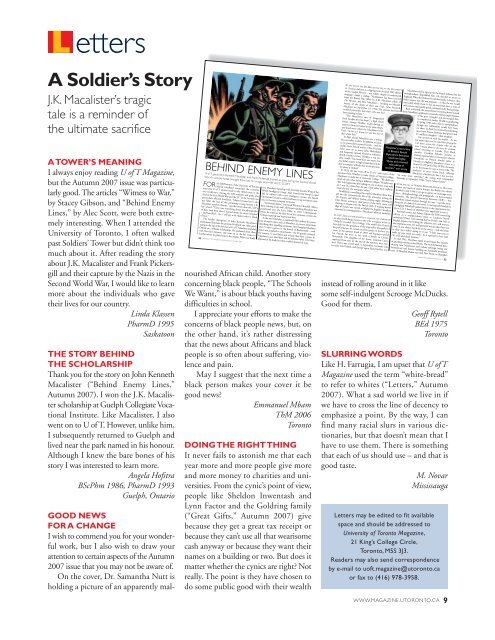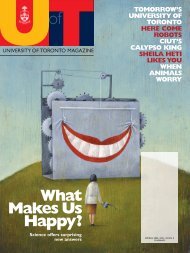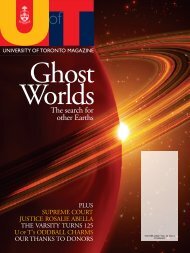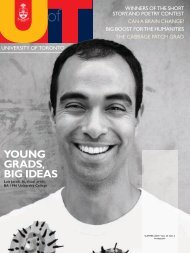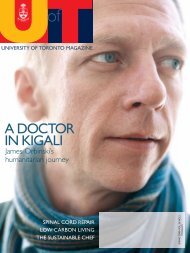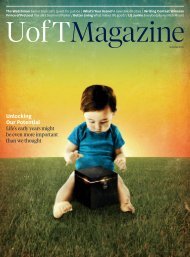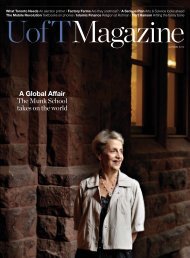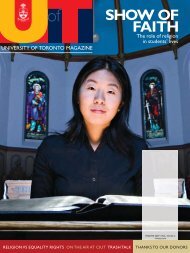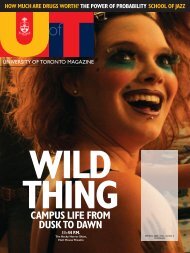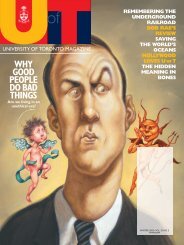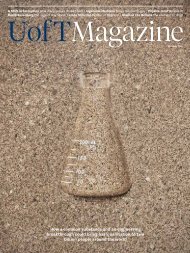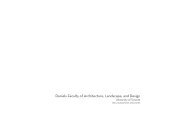THE HOUSE THAT DAVE BUILT - University of Toronto Magazine
THE HOUSE THAT DAVE BUILT - University of Toronto Magazine
THE HOUSE THAT DAVE BUILT - University of Toronto Magazine
You also want an ePaper? Increase the reach of your titles
YUMPU automatically turns print PDFs into web optimized ePapers that Google loves.
L<br />
etters<br />
A Soldier’s Story<br />
J.K. Macalister’s tragic<br />
tale is a reminder <strong>of</strong><br />
the ultimate sacrifice<br />
A TOWER’S MEANING<br />
I always enjoy reading U <strong>of</strong> T <strong>Magazine</strong>,<br />
but the Autumn 2007 issue was particularly<br />
good. The articles “Witness to War,”<br />
by Stacey Gibson, and “Behind Enemy<br />
Lines,” by Alec Scott, were both extremely<br />
interesting. When I attended the<br />
<strong>University</strong> <strong>of</strong> <strong>Toronto</strong>, I <strong>of</strong>ten walked<br />
past Soldiers’ Tower but didn’t think too<br />
much about it. After reading the story<br />
about J.K. Macalister and Frank Pickersgill<br />
and their capture by the Nazis in the<br />
Second World War, I would like to learn<br />
more about the individuals who gave<br />
their lives for our country.<br />
Linda Klassen<br />
PharmD 1995<br />
Saskatoon<br />
<strong>THE</strong> STORY BEHIND<br />
<strong>THE</strong> SCHOLARSHIP<br />
Thank you for the story on John Kenneth<br />
Macalister (“Behind Enemy Lines,”<br />
Autumn 2007). I won the J.K. Macalister<br />
scholarship at Guelph Collegiate Vocational<br />
Institute. Like Macalister, I also<br />
went on to U <strong>of</strong> T. However, unlike him,<br />
I subsequently returned to Guelph and<br />
lived near the park named in his honour.<br />
Although I knew the bare bones <strong>of</strong> his<br />
story I was interested to learn more.<br />
Angela H<strong>of</strong>stra<br />
BScPhm 1986, PharmD 1993<br />
Guelph, Ontario<br />
GOOD NEWS<br />
FOR A CHANGE<br />
I wish to commend you for your wonderful<br />
work, but I also wish to draw your<br />
attention to certain aspects <strong>of</strong> the Autumn<br />
2007 issue that you may not be aware <strong>of</strong>.<br />
On the cover, Dr. Samantha Nutt is<br />
holding a picture <strong>of</strong> an apparently mal-<br />
FOR<br />
his 2002 history <strong>of</strong> the <strong>University</strong> <strong>of</strong> <strong>Toronto</strong>, out, Macalister signed up with theFieldSecurity Wing <strong>of</strong>the<br />
Martin Friedland researched the contribu- British Intelligence Corps. After Continental Europe’s rapid<br />
tions that U<strong>of</strong>Talumni made to the Allied cause inthe fall, he enlisted with a new intelligence service, the Special<br />
two world wars. Among the 630 students and grads who Operations Executive, which had been set upt<strong>of</strong>oment resist-<br />
died in theFirst World War and the 557 in the Second,one ance in German-occupied territories.<br />
particularly affected Friedland. “Maybe because law is also “Set Europe ablaze,” instructed Winston Churchill. After a<br />
my field, the loss <strong>of</strong> this promising young lawyer, J.K. hasty training in spy-craft, the French-speaking Macalister was<br />
Macalister, stoodoutforme,” says theformer dean <strong>of</strong> U <strong>of</strong> T’s parachuted into the Loire Valley in 1943. Unfortunately,<br />
law school. “There was something about the photographs before he could set his little bit <strong>of</strong> the continent on fire, the<br />
<strong>of</strong> him. And then what I learned about his story intrigued Gestapo captured and imprisoned him.<br />
–andhorrified –me.Istill getabit shaken when Ithink In the war’s final days, a panicked Hitler ordered the execu-<br />
<strong>of</strong> him.”<br />
tion <strong>of</strong> captive spies, such as Macalister, to prevent them from<br />
The briefest description <strong>of</strong> John Kenneth Macalister’s describing their appalling treatment. After hanging Macalister<br />
attainments illustrates the promise Friedland saw. After grad- and 15 other captives in the bowels <strong>of</strong> Buchenwald – with<br />
uatingatthe top <strong>of</strong>hislawclass at U <strong>of</strong> T,Macalisterattended piano wire attached to meat-hooks – the SS guards cremated<br />
Oxford on aRhodes Scholarship. He graduated from there the remains. It was Hitler’s aim to keep their fates a secret. In<br />
with first-class honours, and went on to the bar exams in Macalister’s case, the führer and his minions failed. The Nazis<br />
London where he placed tops in the empire. When war broke disposed <strong>of</strong> his body, but they couldn’t destroy his story.<br />
ILLUSTRATION: GARY ALPHONSO/i2i ART BEHIND<br />
ENEMY LINES<br />
U <strong>of</strong> T grads John Kenneth Macalister and Frank Pickersgill trained as spies during the Second World<br />
War. An unlucky break brought their lives to a tragic end • BY ALEC SCOTT<br />
32 UNIVERSITY OF TORONTO MAGAZINE / AUTUMN 2007<br />
nourished African child. Another story<br />
concerning black people, “The Schools<br />
We Want,” is about black youths having<br />
difficulties in school.<br />
I appreciate your efforts to make the<br />
concerns <strong>of</strong> black people news, but, on<br />
the other hand, it’s rather distressing<br />
that the news about Africans and black<br />
people is so <strong>of</strong>ten about suffering, violence<br />
and pain.<br />
May I suggest that the next time a<br />
black person makes your cover it be<br />
good news?<br />
Emmanuel Mbam<br />
ThM 2006<br />
<strong>Toronto</strong><br />
DOING <strong>THE</strong> RIGHT THING<br />
It never fails to astonish me that each<br />
year more and more people give more<br />
and more money to charities and universities.<br />
From the cynic’s point <strong>of</strong> view,<br />
people like Sheldon Inwentash and<br />
Lynn Factor and the Goldring family<br />
(“Great Gifts,” Autumn 2007) give<br />
because they get a great tax receipt or<br />
because they can’t use all that wearisome<br />
cash anyway or because they want their<br />
names on a building or two. But does it<br />
matter whether the cynics are right? Not<br />
really. The point is they have chosen to<br />
do some public good with their wealth<br />
AT <strong>THE</strong> TOP OF <strong>THE</strong> J.K. MACALISTER FILE AT <strong>THE</strong> UNIVERSITY<br />
OF <strong>Toronto</strong> Archives is a clipping from an April 1945 edition<br />
<strong>of</strong> the Guelph Mercury – one which, despite its understated<br />
language, wields awallop. “Notification has been received<br />
from the British War Office by A.M. Macalister, editor <strong>of</strong><br />
The Mercury, and Mrs. Macalister… [residing on Metcalfe<br />
Street], <strong>of</strong> the death <strong>of</strong> their son Capt. John Kenneth<br />
Macalister on September 14, 1944. The parents had been<br />
notified previously that their only son had<br />
been missing in June.”<br />
“The Macalisters sort <strong>of</strong> disappeared<br />
from Guelph after hisdeath,” a high school<br />
friend, George Hindley, recalls during an<br />
interview from his homeon the same sleepy,<br />
tree-lined street where theMacalisters once<br />
lived. “AsfarasIknow,he was the last <strong>of</strong><br />
that whole line.”<br />
In high school, Macalister was a strong,<br />
but notstellar, student. In addition to histo-<br />
ry, he particularly enjoyed French – and the<br />
stylish, lively French teacher, Olive Freeman<br />
(who went on to marry John Diefenbaker<br />
and frequently sported Chanel at otherwise<br />
dowdy Ottawa events). Hindley, atopstudent,<br />
recalls: “You knew Ken was smart, but<br />
you didn’t suspect in high school that he’d be<br />
able to compete with the bestinthe province<br />
– let alone at Oxford.”<br />
In 1933, the pair went <strong>of</strong>f to U <strong>of</strong> Twith many <strong>of</strong> the<br />
province’s best, Hindley to study classics at Victoria College,<br />
Macalister to study law at <strong>University</strong> College. “We didn’t see<br />
much <strong>of</strong>eachother, being at different colleges,” Hindley says.<br />
“But I did appreciate him taking me out to dinner once early<br />
on.Iwas 16, afarm boy; he was a little older, more sophisticated,<br />
the son<strong>of</strong>a newspaper editor.”<br />
In addition to excelling at his studies, Macalister threw himself<br />
into the extracurricular life <strong>of</strong> the university, joining the<br />
UC Literary and Athletic Society, playing rugby, debating at<br />
Hart House, serving as chief justice <strong>of</strong> the moot court, and<br />
chatting en français with the French Club.Aworkingknowledge<br />
<strong>of</strong> French was viewed as helpful for English Canadians<br />
interested inenteringpolitics –Macalister’s ultimate ambition.<br />
IN 1937, MACALISTER BOARDED A STEAMER AND EMBARKED<br />
on the month-long journey to the U.K. to register inlawat<br />
Oxford’s venerable New College. The small-town Ontario<br />
boydidn’t let the grandness <strong>of</strong> thestage affect the quality <strong>of</strong><br />
his performance; he earned excellent grades in his first two<br />
years. In the summer break <strong>of</strong> 1939, still hoping to polish<br />
his French, he went to live with a family in Lisieux,<br />
Normandy. The daughter <strong>of</strong>the house, Jeannine Lucas,<br />
captivated him and, by the end <strong>of</strong> the summer, they married.<br />
Theirs wasa brief idyll: in September, Germany sent<br />
its tanks intoPoland, and Europe again found itself at war.<br />
Macalister’s instructors<br />
in Britain’s Special<br />
Operations Executive<br />
rated him highly:<br />
“Quiet and reserved<br />
with plenty <strong>of</strong><br />
acumen,” one wrote<br />
Macalister tried to sign up for the French military, but his<br />
nearsightedness disqualified him. He decided to return to<br />
England. When he left his wife with her familyinFrance,they<br />
didn’t suspect that she was pregnant – or that the war would<br />
irrevocably divide them. It was an emotional time, a time <strong>of</strong><br />
swift unions and equally quick, unintentionally final partings.<br />
Backin Oxford, the armed forces’recruiting board turned<br />
down Macalister’s application to join the military (again because<br />
<strong>of</strong> his poor eyesight) and encouraged him<br />
tocomplete his studies. He didso,graduating<br />
in spring 1940 with afirst in jurisprudence,<br />
though any celebrations wouldhave been<br />
cut short. In April, he received heartbreaking<br />
news from France: Jeannine had given birth<br />
to astillborn daughter – their daughter.<br />
He carried onwith his studies. At the<br />
bar exams thatyear, he came first among the<br />
142 from across the empire who sat the<br />
tests. Unsure what to do next, he contem-<br />
plated returning to Canada. Hart Clark,<br />
another Canadian Rhodes Scholar at<br />
Oxford reportedthatit was unclearwhether<br />
Canadians in Britain should enlist in<br />
Canada or England. Macalister wrote to a<br />
formerU<strong>of</strong> T pr<strong>of</strong> <strong>of</strong> his, W.P.M. Kennedy,<br />
to let him know he was at loose ends. The<br />
pr<strong>of</strong>essor at once wrote back, <strong>of</strong>fering<br />
Macalister afaculty job, but itwas too late.<br />
“In army since yesterday,” the young man telegraphed<br />
Kennedy inSeptember 1940. “Sorry. Many thanks.”<br />
AFTER<strong>THE</strong> FALL OFNORWAY,DENMARK, BELGIUM, HOLLAND,<br />
France and much <strong>of</strong> eastern Europe, the British war cabinet<br />
decided in July 1940 toset up an agency to encourage resistance<br />
– through sabotage and propaganda –inAxis-occupied<br />
territories. The Special Operations Executive (SOE) –that<br />
Macalister joined midway through the war –was like something<br />
out <strong>of</strong>aJohn le Carrénovel. It was typically headed by<br />
a knighted Whitehall insider, known in the organizationsimplyasCD.Abunch<br />
<strong>of</strong> Old Boys were appointed to runit.<br />
Potential recruits metSelwyn Jepson, the SOE’s recruiting<br />
<strong>of</strong>ficer, in a stripped-down room at London’s Northumberland<br />
Hotel. Interviewing half in French and half in<br />
English, Jepson was looking for reflective men and women,<br />
notimpetuous sorts.He told potential recruits that there was<br />
a one in two chance they’d die inthe service – and told them<br />
to sleep on it before opting in or out. “I don’t want you to<br />
make up your mindtoo easily,” he is reported to have said.<br />
“It’s alife-and-deathdecision.”<br />
In mid 1942, Macalister opted in and began five months<br />
<strong>of</strong> gruelling training across Britain. The recruits learned parachuting<br />
near Manchester and railway sabotage (using real<br />
locomotives) and firearm handling on Scotland’s northwest<br />
coast. AtBeaulieu Manor near lush New Forest, ex-Shanghai<br />
WWW.MAGAZINE.UTORONTO.CA 33<br />
instead <strong>of</strong> rolling around in it like<br />
some self-indulgent Scrooge McDucks.<br />
Good for them.<br />
Ge<strong>of</strong>f Rytell<br />
BEd 1975<br />
<strong>Toronto</strong><br />
SLURRING WORDS<br />
Like H. Farrugia, I am upset that U <strong>of</strong> T<br />
<strong>Magazine</strong> used the term “white-bread”<br />
to refer to whites (“Letters,” Autumn<br />
2007). What a sad world we live in if<br />
we have to cross the line <strong>of</strong> decency to<br />
emphasize a point. By the way, I can<br />
find many racial slurs in various dictionaries,<br />
but that doesn’t mean that I<br />
have to use them. There is something<br />
that each <strong>of</strong> us should use – and that is<br />
good taste.<br />
M. Novar<br />
Mississauga<br />
Letters may be edited to fit available<br />
space and should be addressed to<br />
<strong>University</strong> <strong>of</strong> <strong>Toronto</strong> <strong>Magazine</strong>,<br />
21 King’s College Circle,<br />
<strong>Toronto</strong>, M5S 3J3.<br />
Readers may also send correspondence<br />
by e-mail to u<strong>of</strong>t.magazine@utoronto.ca<br />
or fax to (416) 978-3958.<br />
WWW.MAGAZINE.UTORONTO.CA 9


